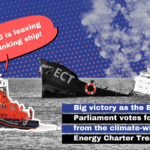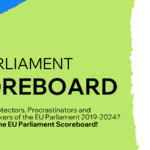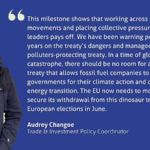Success requires EU leadership
On 2 December, government leaders will gather in Katowice, Poland, for the COP24 climate summit, where all countries of the world, including all EU Member States, need to commit to adopting higher 2030 climate targets by 2020; agree on the Paris rulebook, which will govern how the landmark agreement will be implemented; and provide adequate support for developing countries. To stay below 1.5°C in line with the landmark IPCC report, the EU needs to commit to significantly increase its 2030 target, even beyond the 55% reduction some Member States and the European Parliament are calling for.
What are the objectives of COP24?
COP24 gives governments a chance to show that they are willing to make the Paris Agreement work in practice. First, in Paris, countries have agreed to ramp up their climate pledges over time through five-year review cycles. The first such review process, called the Talanoa Dialogue, concludes at COP24. Its outcome must be a collective decision to revise all climate pledges by 2020, and 130 countries have already expressed their support for this.
Secondly, COP24 is the deadline for adopting a rulebook for how the Paris Agreement will be implemented. Governments must agree on clear and comprehensive rules that ensure enough transparency and accountability, so that countries take adequate, measurable action to cut emissions. The rules should be common to all countries, but also offer capacity building and flexibility for those countries that are not yet able to fulfil all requirements.
Third, at COP24 developed countries need to provide predictable and meaningful financial support to enable developing countries to tackle climate change.
What sets the tone for this year’s negotiations?
All outcomes of this COP24 will be measured up to expectations set by the landmark IPCC special report on global warming of 1.5°C released in October. World climate scientists have shown that global warming impacts have come sooner and hit harder than predicted. To stay below 1.5°C we need to decrease emissions as fast as humanly possible. UN Environment have just released a report stating that countries must raise their ambition five fold to meet the 1.5°C goal.
Governments at COP24 will need to prove that they take the scientific findings seriously and commit to ramp up current climate pledges by 2020, as these currently only keep global warming to around 3°C at best, far above the Paris objectives. The science should also add pressure to conclude the rulebook negotiations and deliver on climate finance.
What is the EU’s role at the COP?
EU ministers attending COP24 must act upon the warnings of the new IPCC report. They should clearly state that they want the EU to increase its targets well beyond what has been agreed already, in line with the IPCC’s outline of 1.5°C pathways. To have a good chance of keeping temperature rise to 1.5°C, the EU’s 2030 target must be increased even beyond the 55% reduction some Member States and the European Parliament are calling for.
It is welcome that the EU brings new ambition to the COP. Just before the start of COP24, the European Commission has published a draft EU climate strategy recommending a target of net zero emissions by 2050, which is a significant improvement over the current targets. The new energy targets will allow the EU to increase its emission cuts from 40 to 45% by 2030. However, to have a good chance of limiting temperature rise to 1.5°C, while avoiding heavy reliance on unproven carbon removal techniques, the EU would need to fully decarbonize already by 2040, and, even more importantly, significantly increase its 2030 climate target, with the 45% only being the new baseline.
A successful conclusion of the rules that allow the Paris Agreement to be effectively implemented is not a small task, and requires the EU to make best use of both its technical and diplomatic expertise. It is in EU’s interest to ensure the maximum environmental integrity of these implementation rules. It needs to can reach out to its vulnerable country partners for common solutions that offer the highest environmental benefits.
EU ministers should also reaffirm climate finance commitments, signal their willingness to scale-up future contributions in line with future needs, and push for more transparency, clearer information and predictability of climate finance. By taking an ambitious position on climate finance, the EU can build trust between parties and deliver a more successful COP24 outcome.
Setting expectations for the EU’s role at COP24, Wendel Trio, Director of CAN Europe said:
“EU leaders attending COP24 need to act upon the overwhelming scientific evidence that we need to massively increase our efforts to tackle the climate breakdown. In the face of the unfolding climate crisis, we need the EU to lead by example and commit to massively increase its emission cuts by 2030. People are rising up to confront climate change, businesses and cities are calling for more action, we have the technology and the money to move much faster. If we fail, it will only be because of the lack of political will.”
Setting expectations for the Polish COP Presidency, Prof. Zbigniew Karaczun of Polish Climate Coalition said:
“The Polish Presidency should play its historic role in spurring all parties to come up with a credible rulebook and commitments to increase their NDCs. To succeed, it must not only show its political and diplomatic skills, but must be willing itself to achieve robust results. The IPCC Special Report clearly shows that we cannot lose any more time in a tug of war or talking about good intentions. Either we speed up climate mitigation or we shall have a sense of hell on earth. Let’s hope the Presidency meets the challenge.”
ENDS
Contact
Ania Drazkiewicz, CAN Europe Head of Communications, ania@caneurope.org, +32 494 525 738
Notes
Highlights of the two weeks:
3 December: CAN Europe press reaction to statements of Heads of State of Government
5 December: CAN Europe and Urgenda Foundation joint press conference “Climate Litigation 2018: How Courts are Enforcing Emissions Cuts” on the actual state of climate litigation – UNFCCC Press Conference Room – Area F Theatre
5 December: CAN Europe press reaction to the outcomes of the negotiations on the EU’s new electricity market, when the future of EU coal subsidies may be decided
8 December: Climate March in Katowice (12:00 – 3:00pm, starting from plac Wolności (Freedom squ.)
10 December: publication of the Climate Change Performance Index, which evaluates the climate protection performance of countries
11 December: CAN Europe and Polish Climate Coalition press conference setting expectations for the high-level segment
12 December: CAN Europe press reaction to the Talanoa Dialogue political phase
Daily: CAN International COP press briefings at 11:00am (except Dec 3 at 10:30) at Press Conference Room 2; CAN International Fossil of the Day awards at 18:00 each day
Climate Action Network (CAN) Europe is Europe’s leading NGO coalition fighting dangerous climate change. With over 150 member organisations from 35 European countries, representing over 1.700 NGOs and more than 40 million citizens, CAN Europe promotes sustainable climate, energy and development policies throughout Europe.



